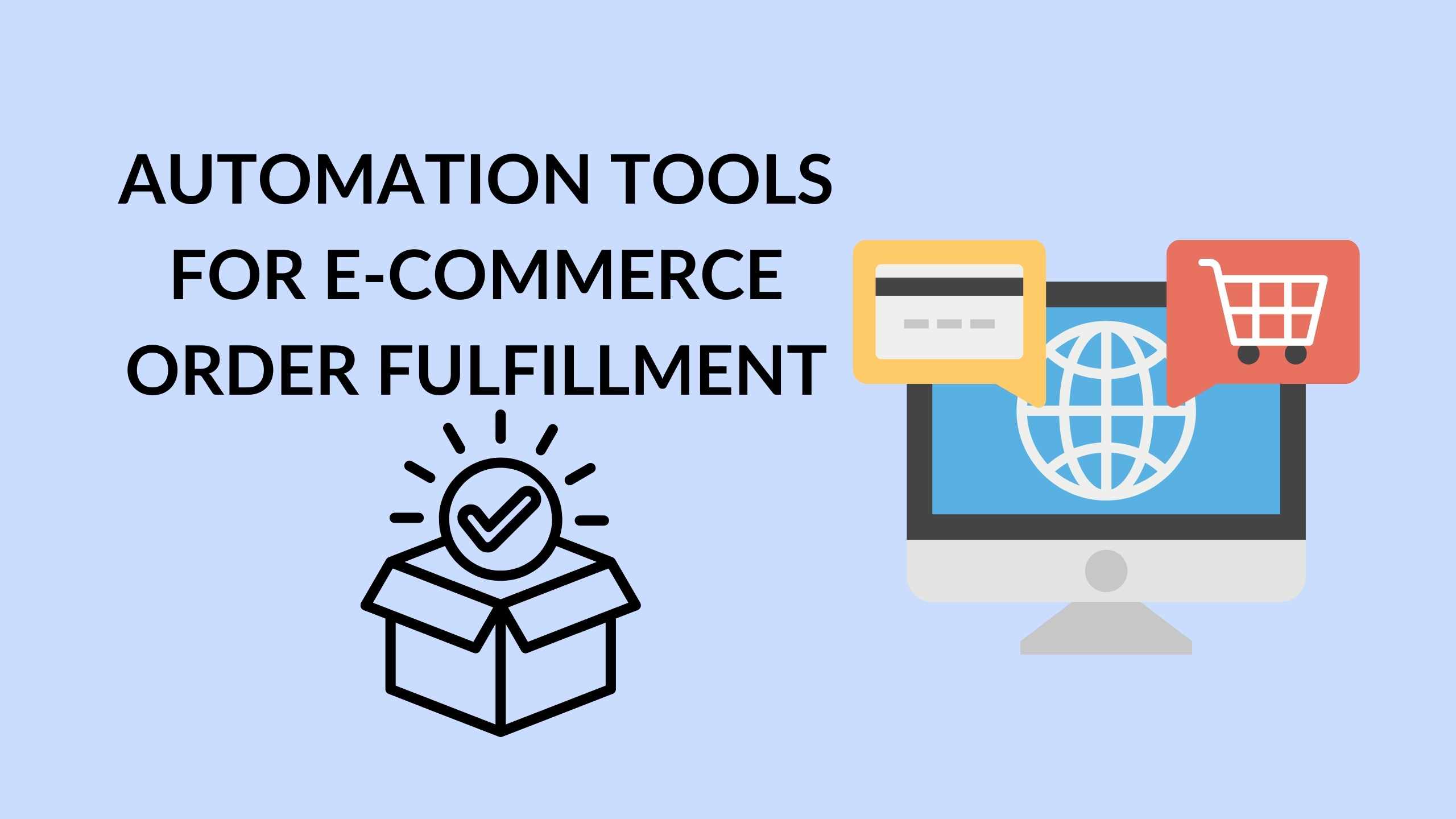Automation Tools for E-commerce Order Fulfillment
-


Automation Tools for E-commerce Order Fulfillment
E-commerce automation has revolutionized the way online businesses operate, allowing them to streamline processes, cut costs, and enhance overall efficiency. One of the critical aspects of e-commerce automation is order fulfillment, where specialized tools play a pivotal role. In this article, we’ll explore the realm of automation tools designed to optimize order fulfillment in the e-commerce landscape.
Understanding E-commerce Automation
E-commerce automation involves leveraging specialized software tools to automate repetitive tasks associated with selling goods and services online. These tools cover various aspects of business operations, including order processing, inventory management, marketing, and customer service. By adopting automation, businesses can focus on growth and core processes while reducing manual labor and associated costs.
Categories of E-commerce Automation Tools
1. Marketing Automation Tools
Marketing automation tools simplify and enhance marketing tasks, reducing manual labor and optimizing promotional efforts. Notable tools in this category include:
- Mailchimp: A powerful tool offering features like email campaigns, automated segmenting, landing pages, social media scheduling, and analytics. Link to Mailchimp
- HubSpot: Known for detailed automation options, HubSpot facilitates tailored customer experiences through automation of various marketing tasks. Link to HubSpot
2. Inventory Management Tools
Critical for tracking stock levels and orders, inventory management tools contribute to efficient e-commerce operations. Popular tools include:
- Linnworks: Offering comprehensive features like inventory tracking, order processing, barcode scanning, sales forecasting, and real-time analytics. Link to Linnworks
- Square: Known for its versatility, Square provides robust inventory management features suitable for diverse e-commerce needs. Link to Square
3. Payment Processing Tools
These tools enable secure and efficient payment acceptance. Key players in this category are:
- Stripe: Known for its payment gateways, fraud detection, invoicing, and secure checkout features. Link to Stripe
- PayPal: A widely used platform offering secure payment processing, invoicing, and checkout solutions. Link to PayPal
4. Customer Service Tools
Ensuring a seamless customer experience at scale is the focus of customer service tools. Notable tools include:
- Zendesk: Offering features such as ticketing systems, automated responses, live chat, and customer feedback surveys. Link to Zendesk
- Freshdesk: Known for its user-friendly interface and features like automated responses and live chat. Link to Freshdesk
Benefits of E-commerce Automation Tools
E-commerce automation tools deliver several advantages, including:
- Improved Customer Service: Streamlined processes lead to simplified product searches, quicker checkout, and personalized recommendations, enhancing the overall customer experience.
- Increased Efficiency: Automation of mundane tasks like data entry saves time and resources, allowing businesses to focus on strategic aspects.
- Enhanced Marketing Efforts: Optimization of marketing campaigns and effective customer behavior tracking enable businesses to refine strategies continuously.
- Improved Scalability: Automation facilitates quick scaling of operations, ensuring consistent customer service standards as businesses grow.
- Reduced Risk of Errors: Automation minimizes the potential for costly mistakes, ensuring accuracy and consistency across the e-commerce process.
Drawbacks of E-commerce Automation Tools
While these tools offer substantial benefits, it’s crucial to be aware of potential drawbacks:
- Difficulty of Setup: Some tools may require complex initial setups, which can be time-consuming and challenging for those without technical experience.
- Expense: Automation tools can be costly, depending on features and customization levels needed.
- Maintenance: Regular maintenance and updates are necessary for effective tool performance, requiring additional resources.
- Security Concerns: Improperly secured automation tools can pose a security risk to e-commerce stores.
- Limited Customization: Some tools may have limitations in customization, potentially leading to inefficient processes.
Understanding these drawbacks is essential for making informed decisions about incorporating e-commerce automation tools into your business.
Best E-commerce Automation Tools
Now, let’s explore some of the best automation tools catering to various aspects of e-commerce:
- CartHook: Focuses on increasing average order volume with smart offers and discounts, particularly effective in post-purchase upselling.
- Shopify Flow: An automation add-on exclusively for Shopify users, simplifying custom workflow creation to automate tasks across stores and apps.
- Zapier: Connects and automates tasks between various web applications, enabling seamless data flow and task automation for e-commerce.
- ReCharge: Specializes in subscription management, making it easy for customers to set up recurring orders, manage payment plans, and more.
- CartStack: A cart abandonment recovery tool, sending personalized emails, text messages, and web notifications to recover abandoned sales.
- Mailchimp: Offers comprehensive email marketing and automation capabilities, making it a versatile tool for various digital avenues.
- AutomateWoo: Designed specifically for WooCommerce, it automates customer-facing activities like follow-up emails, SMS messages, and loyalty programs.
- Salesforce Commerce Cloud: A robust platform for optimizing customer interactions, analytics tracking, and scaling e-commerce operations.
- ActiveCampaign: Empowers businesses with personalized customer experiences, marketing and sales automation, and insightful analytics.
- Automizy: Enables automated email campaigns, segmentation based on user behavior, and visually appealing email template design.
- Autopilot: Facilitates automated customer journeys and campaigns tailored to individual preferences, optimizing e-commerce marketing strategies.
- Klaviyo: Offers advanced features for customer segmentation, personalized emails, and targeted campaigns, integrating seamlessly with popular e-commerce platforms.
In conclusion, e-commerce automation tools provide a transformative advantage to online businesses, but a thoughtful approach is necessary to navigate potential challenges. By understanding the categories, benefits, drawbacks, and exploring top-notch tools, businesses can make informed decisions to enhance their e-commerce operations.








